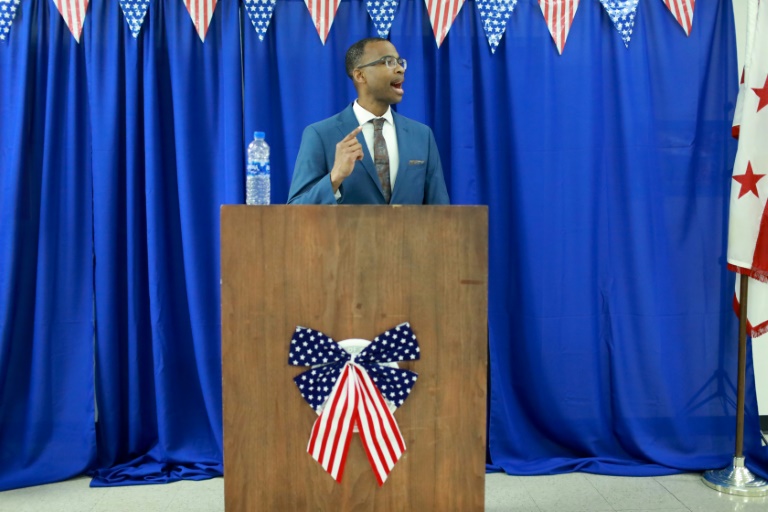A few miles from the gleaming sandstone porticos and colonnades of the White House, Washington’s most unlikely elected official has an executive office of his own — a cell in the District of Columbia Jail.
Joel Caston — convicted for murder as a teenager a quarter-century ago — is finding redemption through politics after becoming the first prisoner in the US capital ever to be elected to public office.
Every day he rises before dawn to study, exercise, and phone the mom he calls his “queen.” Then, like any other local leader, he embarks on a day of solving problems for his constituents in the jail and surrounding area.
As a member of the local Advisory Neighborhood Commission (ANC), the 45-year-old is very much on the ground floor of the US capital’s Byzantine political pantheon — but he has real influence in shaping public policy to improve people’s lives.
“I represent every incarcerated person on the planet,” Caston told AFP in a recent video interview from his makeshift office in the prison.
“If we are given a chance, we can participate in the political process.
We could be an asset, not a liability to our community.”
Caston, who grew up in Washington, was convicted of murder and jailed for life for shooting dead a fellow 18-year-old 27 years ago in the parking lot of a Chinese takeaway in the city’s deprived southeast.
He says he has since worked hard to turn his life around, developing a strict routine of Bible and economics studies, yoga and mentoring.
He speaks five languages, including Arabic and Chinese and has penned series of financial literacy books.
In summer, with Washington having recently expanded voting rights to imprisoned felons, Caston added another string to his bow, beating four fellow inmates with a third of the vote to become an ANC commissioner in Washington’s Ward 7.
– ‘Baby, you won!’ –
“I called my queen.
She was like ‘Baby, you won!'” Caston said, recalling being roused by guards at 5:00 am one day in June to be told of his election victory.
“They were more ecstatic than I was.
I didn’t even know I won.”
Commissioners in ANCs, locally-elected governing board created in the 1970s, act as go-betweens for residents, local government and federal agencies.
Dressed in a pink button-down shirt with a matching striped tie for his video call with AFP, Caston says he takes inspiration from Nelson Mandela’s autobiography documenting 27 years in prison.
“I began to model Mandela’s behavior.
He never succumbed to his environment,” said Caston, who has been behind bars for the same stretch, serving time in 16 different facilities before returning to Washington in 2016.
Caston says he has immersed himself in the world of business and finance, a longtime passion that started as a kid selling candy for pocket money.
In 2018, he founded the Young Men Emerging program, a mentorship initiative pairing newly incarcerated youths with older inmates to offer counseling and foster community.
“I haven’t spent 27, counting, years waiting to go home,” said Caston, who is nicknamed “Obama” for the leadership qualities he has displayed in mentoring sessions.
“I spent it to prepare myself to never come back to prison.”
– Working from prison –
Caston’s journey to elected office began in July last year as local lawmakers voted to grant felons the right to vote from prison.
He teamed up with members of the DC Council to produce a podcast encouraging his peers to engage in the democratic process and to raise awareness of the fight for prisoners’ voting rights.
This brought to his attention the ANC and its upcoming election.
“When I discovered that, a lightbulb went off in my brain,” he recalled.
Caston campaigned via YouTube and an online manifesto promoted to constituents outside the jail, including the residents of a women’s homeless shelter and an apartment building.
The largest technical challenge he faces in serving his community is the most obvious: he can’t just stroll around the neighborhood, going door-to-door to meet residents.
But he has enlisted the help of advocacy groups and supporters on the ground to be his eyes, ears and mouthpiece.
Meanwhile the younger prisoners he mentors have been getting him up to speed on technology so he can meet constituents by video call on a laptop.
And while they say time is your one luxury while you serve your sentence, Caston often finds there aren’t enough hours in the day.
“Once I got my… official email address, I logged on to 600 plus emails in my inbox.
I was in a deficit from the beginning,” he said.
Caston’s two-year stint may finish early as he has been pursuing early release under a law allowing inmates convicted as teenagers to petition for reduced sentences after 15 years.
He tries not to think too much about the future, preferring to live in the moment, but he says he will remember representing his ward as the opportunity of a lifetime.
“If my seat… served only for the purpose to inspire other people to engage in civic engagement matters,” he says, “then I’ve served my purpose.”











